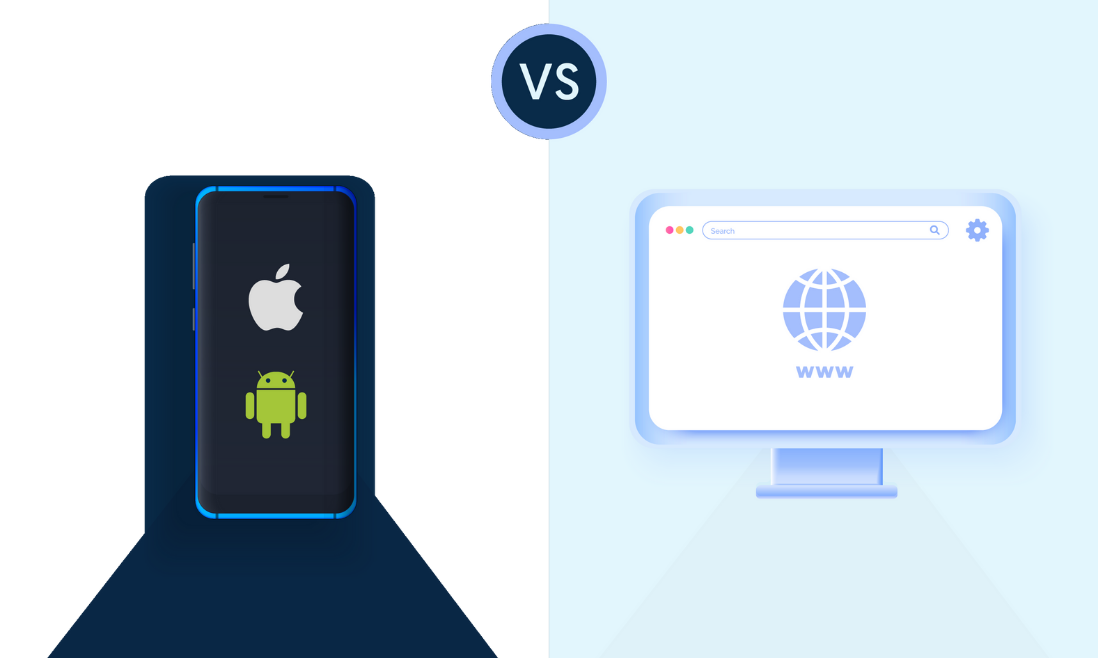Are you trying to decide between mobile app development and web development for your next project? This critical decision can significantly impact the trajectory of your business or career.
Mobile app development focuses on creating applications for mobile devices, often requiring platform-specific programming, with access to device features and offline capabilities. Web development involves building websites accessible through web browsers, using languages like HTML, CSS, and JavaScript, generally requiring internet connectivity.
In this blog post, we’ll dive deep into the world of mobile app development and web development, exploring their distinct advantages, technical nuances, and the career opportunities each offers. We’ll compare these two development paths on various fronts, from technical requirements and user experience to their impact on business growth and career prospects.
By the end, you’ll have a clearer understanding of which path aligns best with your goals and why. So, without further ado, let’s get into it.
Mobile App Development vs Web Development: How They Affect Businesses
Mobile app development and web development, each has its unique benefits and challenges that impact businesses differently. Let’s take a closer look.
The Pros & Cons of Mobile App Development for Businesses
Pros:
- Speed and Efficiency: Mobile apps, particularly native apps, are known for their speed. Designed specifically for mobile devices, they offer enhanced performance, with some even functioning offline.
- Access to User Data: Mobile apps provide businesses with broad access to user data such as location, demographics, and user behavior. This data is crucial for tailored marketing strategies and customer insights.
- Optimized Mobile Experience: Apps offer a user experience highly optimized for mobile devices, ensuring greater user engagement and satisfaction.
- Push Notifications: This unique feature allows businesses to keep users engaged with updates and promotions, directly enhancing customer retention.
- Personalization: Mobile apps enable businesses to deliver a highly personalized experience, boosting brand loyalty and user engagement.
Cons:
- Cost: Developing and maintaining mobile apps, especially on multiple platforms like Android and iOS, can be expensive. Additional costs include app store submission fees and in-app purchase commissions.
- Time-Intensive Development: Developing a basic app can take several months, with added time for design and feature modifications.
- Complex Updates: Updating apps across different platforms requires significant effort in debugging, testing, and deployment, adding to the time and cost.
The Pros & Cons of Web Development for Businesses
Pros:
- Universal Access: Web pages can be accessed on any device with a browser, regardless of the operating system, offering broader reach.
- Simpler Development Process: Compared to app development, websites can be developed more quickly and with fewer resources.
- Cost-Efficiency: Web development can be relatively inexpensive, with many platforms offering free or low-cost options for creating functional websites.
- SEO Benefits: Websites are crucial for improving search engine rankings, helping small businesses gain visibility and reach their target audience.
Cons:
- Dependence on Internet Connectivity: Websites require a stable internet connection, limiting access in areas without connectivity.
- Performance Issues: Websites may suffer from slower loading times, especially when handling extensive content or large user bases.
- Hidden Costs: While initial development costs may be low, additional features and maintenance can lead to increased expenses over time.
The choice between mobile app development and web development depends on a business’s specific needs, target audience, and resources. While mobile apps offer personalized user experiences and efficient performance, they come with higher development and maintenance costs.
On the other hand, web development provides broader accessibility and cost-efficiency but may lack the advanced features and personalization that mobile apps offer. Businesses must weigh these factors to decide which digital strategy aligns best with their goals and budget.
Mobile App Development vs Web Development: Technical Differences

Understanding the technical differences between mobile app development and web development is crucial for businesses to decide on the best digital strategy.
Mobile apps are often developed for specific platforms (iOS, Android). This requires using platform-specific programming languages like Swift for iOS and Kotlin or Java for Android. Mobile apps also have the advantage of accessing device hardware (camera, GPS, accelerometer), offering functionalities that are more interactive and personalized.
Web development typically involves creating applications accessible across various devices and operating systems through a web browser. Web development uses languages like HTML, CSS, and JavaScript, along with frameworks such as React, Angular, or Vue.js, to create interactive and responsive web pages.
Choosing between mobile app development and web development hinges on understanding their technical differences.
| Criteria | Mobile App Development | Web Development |
|---|---|---|
| Development Platform | Platform-specific (iOS, Android) | Cross-platform (accessible via web browsers) |
| Programming Languages | Swift (iOS), Kotlin/Java (Android) | HTML, CSS, JavaScript |
| Hardware Integration | Direct access to device hardware (camera, GPS, etc.) | Limited hardware access |
| Offline Functionality | Often available | Dependent on internet connectivity |
| Development Tools | IDEs like Xcode (iOS) and Android Studio (Android) | Various web development tools and frameworks |
| User Interface | Tailored for touch and mobile screens | Responsive design for various screen sizes and types |
| Performance | Generally higher, with more interactive capabilities | Can vary, generally lower than native apps |
| Updates | Requires user to download updates | Centralized updates on the server |
| Maintenance | Complex, platform-dependent | Generally simpler, with central modifications |
| Scalability | Needs to handle diverse device capabilities | Primarily server-dependent scalability |
| Security | Specific to mobile platforms and app stores | Must address web-based security threats |
| SEO Optimization | Not applicable | Crucial for online visibility |
Mobile app development tends to be more complex, given the need to develop for multiple platforms and adhere to specific guidelines of app stores. In contrast, web development, while also requiring cross-browser compatibility, is generally less complex.
Mobile apps typically offer superior performance and can leverage device capabilities more effectively than web apps. However, web apps are more accessible, as they don’t require users to download and install them.
Both platforms face unique scalability and security challenges. Mobile apps must handle varying device capabilities, while web apps need to ensure robust security against web-based threats.
Mobile App Development vs Web Development: Career Aspect

The tech industry constantly evolves, offering diverse career opportunities in both mobile app development and web development. Understanding the career aspects of each field can help aspiring developers and IT professionals make informed choices about their career paths.
| Criteria | Mobile App Development | Web Development |
|---|---|---|
| Skills and Expertise | Java, Kotlin, Swift, Objective-C; Platform-specific tools | HTML, CSS, JavaScript; Frontend and Backend frameworks |
| Job Market | High demand in specialized mobile technology sectors | Broad demand across various industries |
| Career Progression | Junior Developer → Senior Developer → App Development Manager → CTO | Junior Developer → Senior Developer → Project Manager → CTO |
| Freelancing | Substantial opportunities with global projects | High flexibility with a wide range of projects |
| Salary Prospects | Generally competitive, reflecting specialized skills | Competitive, varies with expertise and specialization |
Choosing between a career in mobile app development or web development depends on individual interests, aptitude for learning specific technologies, and career goals.
- Skillset Evolution: Mobile app development often requires deeper specialization in specific platforms, whereas web development demands a broader understanding of various technologies.
- Industry Demand: Both fields have strong demand, but mobile app development is more niche, focusing on mobile platforms. Web development, on the other hand, has a wider application across industries.
- Project Diversity: Mobile developers often work on more platform-specific projects, while web developers can experience a broader range of projects due to the universal nature of the web.
- Remote and Freelance Work: Both fields offer excellent opportunities for remote and freelance work, though this may depend on individual project and company policies.
- Learning Curve: The learning curve in mobile app development can be steeper due to the need for platform-specific knowledge. Web development might offer a more gradual learning curve with its wide range of resources and community support.
Both fields offer promising opportunities, competitive salaries, and the chance to work on innovative projects. Aspiring developers should consider their personal strengths and the kind of projects that excite them to make the best career choice.
FAQ
1. Which is better mobile app development or web development?
Determining whether mobile app development or web development is better depends largely on the specific needs and goals of a project or business. Mobile app development is ideal for applications requiring advanced user interaction, personalized experiences, and offline accessibility. On the other hand, web development is more suited for projects needing broader accessibility and compatibility across various devices without the need for users to download an app.
2. Can a web developer become a mobile app developer?
A web developer can become a mobile app developer. The transition involves learning new skills and tools, but the foundational programming knowledge acquired in web development provides a strong base. Web developers are already familiar with key concepts like UI/UX design, client-server architecture, and programming logic, which are applicable in mobile app development.
3. Who earns more app developers or web developers?
The earning potential between app developers and web developers can vary based on several factors such as geographical location, experience level, expertise, and the specific industry they work in. Generally, app developers tend to earn slightly more than web developers. This difference is often attributed to the specialized skills required for mobile app development and the high demand for mobile applications in various sectors.

